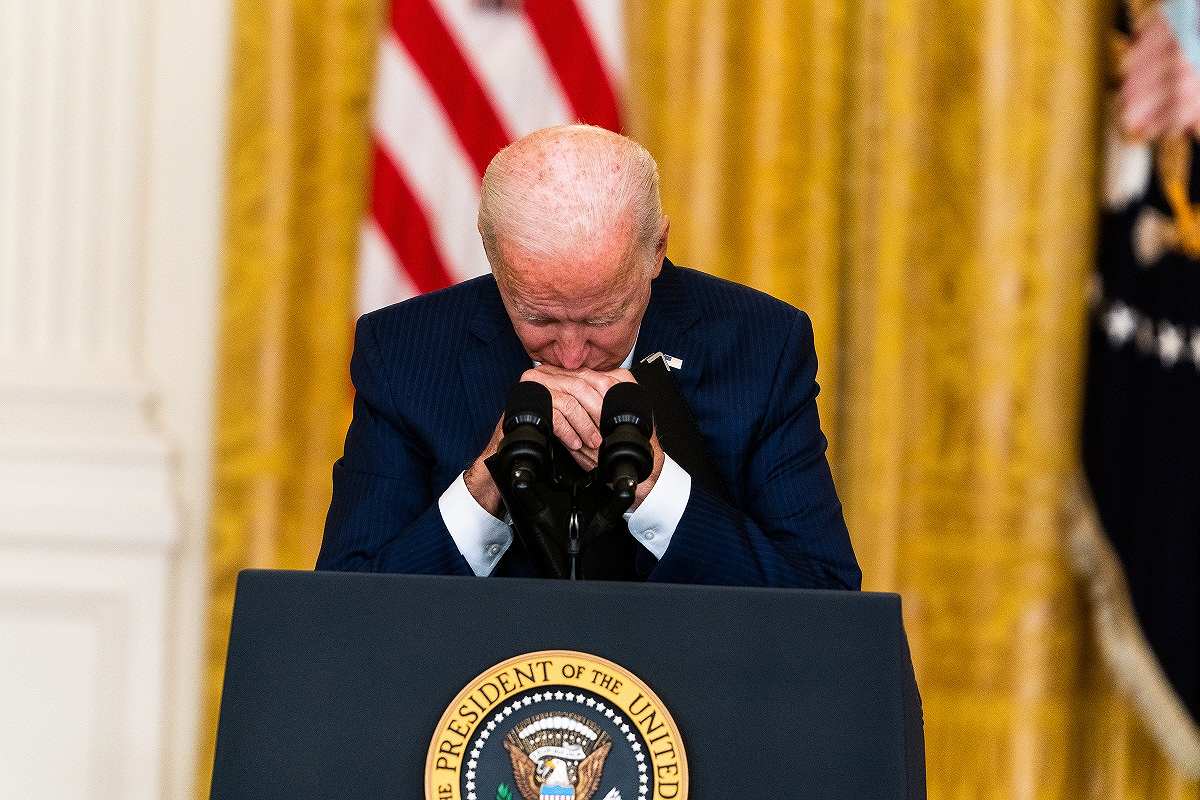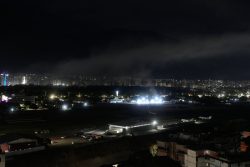
President Joe Biden at a news conference after 13 U.S. service members were killed in a suicide bombing outside the Kabul airport in August 2021.
15:49 JST, April 8, 2023
WASHINGTON – The White House said Thursday that it now prioritizes the early evacuation of Americans during security crises overseas, offering a tacit admission of fault two years ago in Afghanistan as the Biden administration provided Congress with long-awaited internal assessments of its chaotic response to Kabul’s impending collapse.
The material sent to Capitol Hill, which is classified and has not been made public, includes reviews conducted by several government agencies directly involved in the operation and the fateful decision-making that preceded it. A separate summary of events released by the National Security Council does not expressly accept blame for the administration’s miscalculations; it does, however, acknowledge how the hard-learned lessons of Afghanistan inspired officials to act with much greater urgency during subsequent emergencies.
The documents’ disclosure is certain to invite a fresh round of political feuding as House Republicans press ahead with oversight hearings scrutinizing the closing days of America’s longest war. The White House had faced intensifying pressure to turn over the agency assessments, which were mostly completed last year, and their transmission Thursday – as Washington prepared to pause for a long holiday weekend – appeared designed to minimize attention.
In a statement, Rep. Michael T. McCaul (R-Texas), chairman of the House Foreign Affairs Committee, suggested that the materials transmitted to Congress were incomplete, and he implored the administration to declassify “as much as possible” as lawmakers investigate “why the withdrawal was such a disaster.”
GOP leaders have portrayed the U.S. departure from Afghanistan as a deadly fiasco for which President Biden and his top advisers have ducked accountability. An estimated 170 Afghans were killed alongside 13 American troops in a suicide attack outside Kabul’s airport. Days later, Air Force drone operators killed 10 civilians, including seven children, believing incorrectly that they were targeting another would-be bomber.
The White House has maintained that Biden had few options after his predecessor, President Donald Trump, signed a deal with the Taliban in 2020 that required U.S. forces to leave the country. With its summary, the White House again sought to fault Trump for the chaos, even as it acknowledged that the Biden administration has handled later crises – in Ukraine and Ethiopia – far differently after what transpired in Kabul.
“We now prioritize earlier evacuations when faced with a degrading security situation,” the summary said, noting that the administration withdrew some personnel from the U.S. Embassy in Ethiopia in November 2021 “despite the vigorous objections of the Ethiopian government,” and last year evacuated personnel from the U.S. Embassy in Kyiv nearly two weeks before Russia’s invasion of Ukraine.
But the White House summary glosses over other key details about the evacuation from Afghanistan that cast the Biden administration in a negative light, including that Biden had ordered the withdrawal of all U.S. troops despite recommendations from defense officials who wanted the commander in chief to keep a force of about 2,500 in Afghanistan to help prevent the U.S.-backed government from collapsing.
The document makes no mention either that senior U.S. military officials who participated in the evacuation expressed frustration with the administration when interviewed as part of an earlier Defense Department investigation. In documents first reported on by The Washington Post last year, the senior commander during the mission, Rear Adm. Peter Vasely, told military investigators that the United States would have been “much better prepared to conduct a more orderly” evacuation “if policymakers had paid attention to the indicators of what was happening on the ground.”
A senior administration official, speaking on the condition of anonymity because the matter remains so politically volatile, said that, for days before Taliban fighters swept into the capital on gun trucks, senior Pentagon officials recommended against launching the evacuation. The operation began Aug. 14, after Biden’s senior national security advisers changed their recommendation, the official said. The Taliban seized control of Kabul the following day, after Afghan President Ashraf Ghani fled the country.
The Trump administration, which opened negotiations with the Taliban, pledged to withdraw all U.S. forces from Afghanistan by May 2021 in exchange for promises that the militant group would not target U.S. troops as they left and not allow the country to be used to plot attacks against the United States or its allies. Ghani also agreed to release 5,000 Taliban detainees as part of the agreement to end the conflict.
Biden, who pledged to end the war while campaigning for president, later altered the deadline to say that U.S. forces would be out by Sept. 11, 2021, the 20th anniversary of terrorist attacks on the United States that precipitated the invasion.
The evacuation pulled from harm’s way more than 120,000 people – Americans and Afghans who aided the war effort – in less than three weeks, but it was an operation that appeared on the brink of spiraling out of control for days before catastrophe struck.
With few good options to ensure security outside the airport where thousands had massed, desperate to catch a departing flight, U.S. military officials reached an uneasy agreement with the Taliban. Militant fighters were posted outside to maintain order while coalition troops processed those seeking entry. Service members involved in the mission have since said that they witnessed Taliban foot soldiers routinely beating civilians attempting to reach the airport and executing some of them.
John Kirby, a spokesman for the National Security Council, told reporters at the White House that it is “undeniable” that Trump officials’ decisions and lack of planning “significantly limited” the options that were available to Biden.
When Biden took office, Kirby said, he inherited a force of about 2,500 troops in Afghanistan, the fewest that had been there since 2001. The Special Immigrant Visa program run by the State Department to consider which Afghans deserved refuge in the United States for assisting the U.S. war effort also had been “starved for resources,” Kirby said, creating an uphill climb for the administration to move quickly to assist Afghan allies in harm’s way.
Kirby said there was “always going to be tension” between U.S. officials highlighting warning signs that the government in Kabul might collapse and the risk of undermining Ghani’s team and Afghanistan’s military. He took a particularly dim view of the agreement the Trump administration signed with the Taliban in Doha, Qatar, in February 2020 setting the stage for a full withdrawal.
“Do not underestimate the effect that Doha agreement had on the morale and the willingness to fight of the Afghan defense forces,” Kirby said.
Despite civilian deaths and U.S. troops describing problems with food shortages, sanitation and people sneaking into the airport without screening, Kirby sought to make the case Thursday that the evacuation went well. “I’m sorry, I just don’t buy the whole argument of chaos,” Kirby said. “It was tough in the first few hours. You would expect it to be; there was nobody at the airport and certainly no Americans. It took time to get in there.”
McCaul called Kirby’s remarks “disgraceful and insulting.” It was Biden, he said, who decided to withdraw U.S. forces and on which date, and “he is responsible for the massive failures in planning and execution.”
Sen. Roger Wicker (R.-Miss.), the top Republican on the Senate Armed Services Committee, also condemned the White House’s framing of the Afghanistan withdrawal. “Instead of addressing honestly and openly the substantial flaws in its decision-making process, the Biden administration has provided the public a full-throated and deeply partisan explanation of its indefensible Afghanistan policy,” he said.
Asked whether anyone in the U.S. intelligence community would be held responsible for failures in Afghanistan, Kirby said: “It’s really hard. I’ve yet to see an intelligence assessment that ever was 110 percent certain about something. They get paid to do the best they can.” He acknowledged, however, that “clearly, we didn’t get things right,” including “how fast the Taliban were moving across the country” during the first two weeks of August 2021, secret capitulation deals that had been made with Afghan security force commanders, and “how fast they were going to fold.”
In February, an independent assessment by a U.S. inspector general concluded that each administration made moves – Trump’s decision to cut a deal with the Taliban and Biden’s choice to follow through on it – that presaged disintegration of Afghan security forces whom the Pentagon had equipped and trained for years. Those two actions, the watchdog said, “fundamentally altered every subsequent decision” by the U.S. government, the Afghan government and the Taliban, and “destroyed the morale of Afghan soldiers and police” because they relied so heavily on U.S. air power to stop the militant group.
The inspector general also determined that the “stage had been set” for collapse long before, by multiple U.S. administrations and the Afghan government, which failed to build units that were self-sustainable.
"News Services" POPULAR ARTICLE
-

Japan’s Princess Kako Marks 31st Birthday, Contributed to Key Events This Year
-

Arctic Sees Unprecedented Heat as Climate Impacts Cascade
-

Brigitte Bardot, 1960s Sultry sex Symbol Turned Militant Animal Rights Activist Dies at 91
-

At Least 7 Explosions and Low-Flying Aircraft Are Heard in Venezuela’s Caracas
-
◎竹増ローソン社長インタビュー〔1〕_20251228YGTGS000198_C-250x166.jpg)
Convenience Store Chain Lawson May Start OTC Drug Delivery in 2026
JN ACCESS RANKING
-

BOJ Gov. Ueda: Highly Likely Mechanism for Rising Wages, Prices Will Be Maintained
-

Japan Govt Adopts Measures to Curb Mega Solar Power Plant Projects Amid Environmental Concerns
-

Core Inflation in Tokyo Slows in December but Stays above BOJ Target
-

Osaka-Kansai Expo’s Economic Impact Estimated at ¥3.6 Trillion, Takes Actual Visitor Numbers into Account
-

Major Japan Firms’ Average Winter Bonus Tops ¥1 Mil.
























